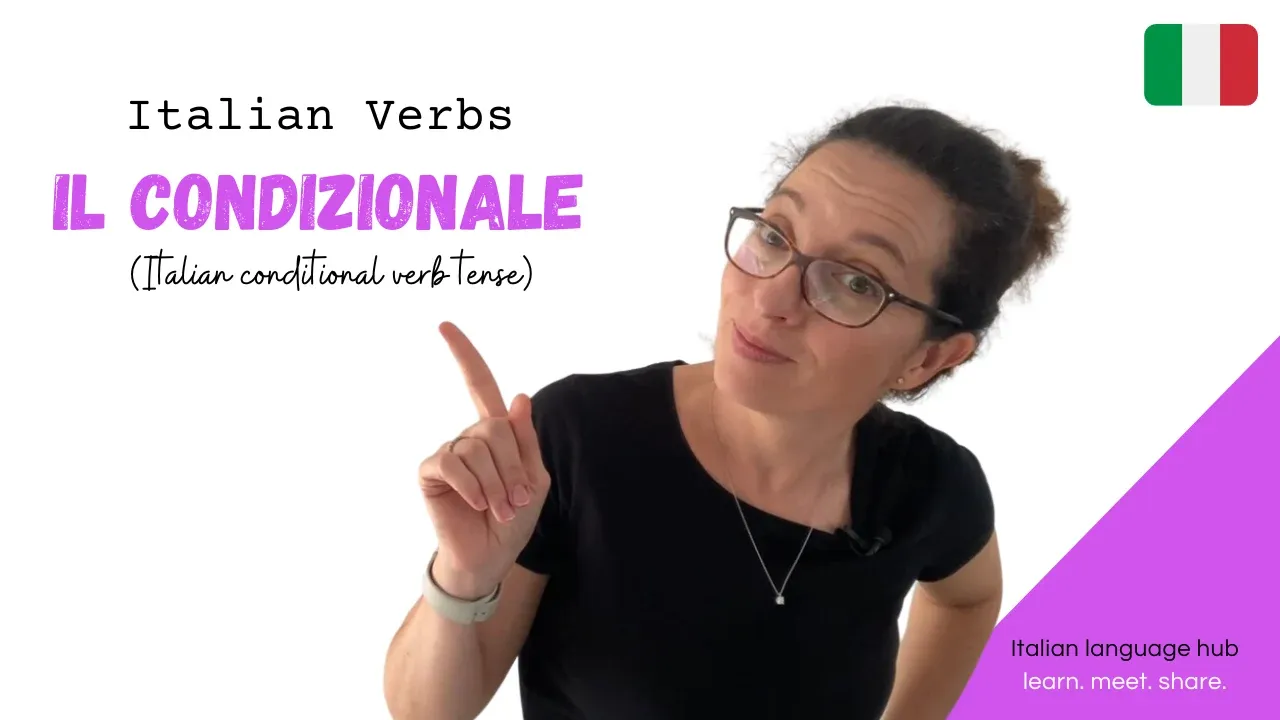The Italian Conditional Tense

❤️ If you like my videos you can support my channel in different ways:
- you can send me a donation (of your choice) by clicking on the heart under the YouTube video and become a SUPER FAN❤️
- you can also support me for free by watching the entire video, writing a comment, or sharing it!
In this lesson you will learn to form and use correctly the conditional verb tense in Italian. The conditional or condizionale is used to express:
- uncertainty
- doubt
- wishes
- assumptions
- hypotheses
- polite requests
If you are translating it to English you can say that it’s the same as using the formale “would” + verb.
- Mi piacerebbe andare in Polinesia - I would like to go to Polinesia
- Al tuo posto prenderei la felpa blu - If I were you I would take the blu sweater
- Vorrei un caffè - I would like a coffee
DOWNLOAD HERE THIS LESSON IN PDF FORMAT FOR FREE!
In this lesson I will show you how to form it and use it. I also suggest that you study the subjunctive together with this verb tense because these two tenses are used together and they can be confusing. So learning the subjunctive might help you out here! (check my video on my YouTube channel. You will find the link under this video!)
This is how to form the conditional in Italian.
Please note that you have a conditional present and a conditional past tense.
We will first focus on the condizionale presente.
Good news first! the verbs that end with ARE and ERE so verbs like AMARE and PRENDERE have the same conjugation and there is a one letter change with the verbs that end with IRE like APRIRE.

- Non partirei mai senza salutarti - I would never leave without saying goodbye to you
- Non crederei mai alle sue parole - I would never trust his words
- Chiuderesti la finestra per favore? Would you please close the window please?
Now, this conjugation is correct for the REGULAR verbs. In the next chart you will learn the conjugation of the 2 most important irregular verbs that you must immediately learn.

- Sarei uno studente migliore se solo studiassi un pochino - I would be a better student if only I studied a little bit.
- Avrei una domanda da farti - I have (would have) a question to ask you
Now that you know how to form it we can learn when to use it. This tense is often used to talk about something that might happen or to talk about very improbable situations.
A hypothetical clause is basically a sentence that uses ‘if’ or an equivalent, to create a situation where one thing will happen dependent on another. You learned about this IF sentence in the lesson on the congiuntivo I will link the video so you can review it!
Just like in English with would you can use the conditional for:
Polite Requests And Advices
- Chiuderesti la porta per favore? - Would you please close the door?
- Secondo me, dovresti venire alla festa stasera! - I think you should come to the party tonight!
Wishes or intention to do something:
- Vorrei venire al cinema con te - I would like come to the movies with you
- Vorrei smettere di lavorare! - I would like to stop working
- Mi piacerebbe andare a Miami! - I would like to go to Miami
Doubt
- Come farei senza di te? - What would I do without you?
- Non capisco come sarei d’aiuto - I don’t understand how I would be helpful
Now that you know this you can learn the Italian conditional in the past.
The Italian past conditional, or condizionale passato (aka condizionale composto) is formed with the conditional present of the auxiliary verb avere or essere and the past participle of the acting verb. It can be translated with the English form of would have + verb let’s take the auxiliary verbs essere and avere and let’s add the past participle of two verbs, in this case the verbs parlare and andare.
In the next chart you will see how it works with these verbs.
Take note how they are formed and use these verbs as examples.
Remember that the choice of using the auxiliary verb essere or avere depends on the verb that follows. There is a specific video on that on my channel. I will also link that under this YouTube video.
Another rule that you need to remember is that when you have the auxiliary verb essere you will need to match the gender and number of the second verb... in this case the past participle verb.

You can use it to talk about an information of the past that you are not 100% sure about:
- I ladri sarebbero entrati dalla finestra del salotto - The thieves would have entered through the window of the living room
or you can use it to talk about an action that has not been carried out:
- Mi sarebbe piaciuto molto venire alla tua festa, ma ero ammalata! - I would have liked to come to your party but I was sick!
To point out that you shouldn’t have done something and that you are now regretting it you can also use the Italian condizionale (“shouldn’t have + past participle”),
- Non sarei dovuto andare a letto così tardi! - I shouldn’t have gone to bed so late
- Non avrei dovuto ascoltarli - I shouldn’t have listened to them
The conjugation of the conditional passato is actually something really interesting because you can use it to talk about a Future Action…In The Past,
Let’s look at this sentence:
- Sapevo che avresti telefonato per scusarti. - I knew you would have called to say sorry
- Sapevo: first action in the past
- avresti telefonato : second action in the past… (so a future action in the past)
Now, there is a lot more to the conditional but start of with this and build it up slowly! Do not rush it! If you wish to do some exercises I suggest you buy this grammar book that you find in the link below and go to page 129 to do some exercises!


